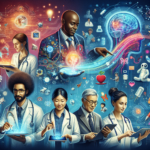In an era where technology intertwines with every aspect of our lives, the conversation around harnessing Artificial Intelligence (AI) for broader, more equitable access to knowledge grows ever more critical. Mustafa Suleyman, a prominent executive at Microsoft, explores this transformative potential of AI in revolutionizing knowledge accessibility for everyone, everywhere. In this blog post, we delve into Suleyman’s compelling insights and envision a future powered by AI, deciphering its implications for education, industry, and society at large.
Understanding Mustafa Suleyman’s Vision
As a co-founder of DeepMind and a key player at Microsoft, Mustafa Suleyman is no stranger to the cutting-edge frontiers of AI. In his recent discourse, Suleyman emphasized how AI is poised to place vast repositories of knowledge right at our fingertips. He envisions a world where geographical and logistical barriers are obliterated, thanks to the seamless integration of AI in sharing and nurturing knowledge.
**Key Takeaways from Suleyman’s Vision:**
- Democratization of Information: AI could dismantle existing barriers to information access, making knowledge universally available.
- Empowered Learning Environments: AI-driven tools could customize educational experiences to meet diverse learning needs and styles.
- Facilitating Innovation: By broadening access to resources, AI can foster innovation and creativity on a global scale.
AI in Education: Bridging the Knowledge Gaps
The deployment of AI in education stands as one of the most potent solutions to worldwide educational disparities. By optimizing learning experiences through AI, schools and institutions can tailor their approaches to meet the unique requirements of individual students. Interactive AI interfaces will not only enhance student engagement but also facilitate personalized learning trajectories that respect the pace and preference of each learner.
- Adaptive Learning Systems: AI can assess a student’s strengths and weaknesses, thereby crafting a curriculum that caters specifically to their needs.
- Global Classroom: Virtual classrooms powered by AI can transport students to any corner of the globe, attending lectures by experts from any field.
AI’s Role in Industry Transformation
Suleyman’s belief in the transformative power of AI extends beyond education. He predicts paradigm shifts within various industries leading to enhanced productivity and efficiency. By providing professionals instant access to vast amounts of information, AI could revolutionize industries ranging from healthcare to finance, ultimately redefining our economic landscapes.
- Healthcare Revolution: AI-powered diagnostics could lead to quicker, more accurate treatment, improving patient care.
- Financial Insights: In the finance realm, AI could enhance decision-making processes through rapid and astute data analyses.
Societal Implications: Ethical Considerations and AI Governance
While the AI-driven transformation of knowledge access is promising, it also brings to the fore pressing ethical considerations. Suleyman acknowledges the dual-edged nature of AI: while it can dismantle barriers, it must be regulated thoughtfully to prevent misuse.
- Data Privacy and Security: There must be rigorous checks to safeguard user data against breaches and misuse.
- Bias and Fairness: Developers must ensure that AI algorithms do not perpetuate existing biases or create new inequalities.
In this vein, strong ethical frameworks and regulatory norms will be imperative to balance innovation with the digital rights and freedoms of individuals.
The Future of AI-Enabled Knowledge Sharing
Looking ahead, Suleyman envisions an ecosystem where AI is harnessed collaboratively, unifying global forces to address real-world problems through open access to knowledge. This collective intelligence could not only tackle pressing issues like climate change and public health crises but also democratize innovation across underserved regions.
The Path Forward: Collaborative Innovation
The path forward hinges on fostering collaborations between stakeholders—governments, corporates, innovators, and academia—to build an AI ecosystem that is as inclusive as it is innovative. Here, Suleyman’s vision comes full circle, urging a synergetic approach to navigate the AI-driven era.
- Open-Source Innovations: Encouraging open-source AI development can expand access and accelerate advancements.
- Global Partnerships: Cross-border partnerships can ensure that diverse perspectives shape AI development, minimizing bias.
Conclusion
Mustafa Suleyman’s advocacy for AI rests on a simple premise: knowledge, when made universal and accessible, can catalyze unprecedented human progress. While challenges exist—ethical, logistical, and technological—the potential dividends of an AI-empowered world could well justify the journey forward. As AI evolves, fostering a balanced, inclusive technological renaissance was never more critical. In advocating ethical AI, Suleyman underscores the moral imperative to innovate responsibly, harnessing technology to empower, educate, and elevate humankind.
“`








